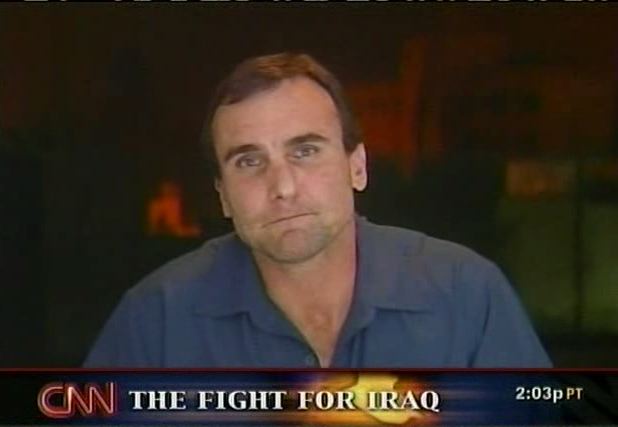NR: "This is a piece of grand political theater."

Click photo to play
Length: 3:47
FREDRICKA WHITFIELD: I'm Fredricka Whitfield, it is April 8th and you are in the NEWSROOM.
This Easter Sunday, tragic word coming out of Baghdad. The U.S. military announced the deaths of ten more American troops, including six who died today in various attacks.
Also today, bombs killed at least 21 civilians, including 17 in the town of Mahmoudiya. And with tomorrow marking the fourth anniversary of the fall of Baghdad, the Iraqi government abruptly announced a citywide vehicle ban to take effect at dawn.
At a briefing today in Baghdad, the military's top spokesman said again that the U.S. troop surge is showing signs of progress. That remains a point of contention. So we sought the perspective of CNN's Michael Ware.
MICHAEL WARE, CNN CORRESPONDENT: What we're seeing already with only two of the five additional U.S. combat brigades already in place or currently in place, is that there has been an impact on particular types of violence, at least in the capital of Baghdad itself.
What we've seen is a decline, not an eradication of, but a decline in sectarian murders. It's much harder now for the death squads to operate. That's for two reasons. One is Americans are maintaining much more of a constant presence in many of the areas where the death squads were working. Secondly, the Americans are now essentially babysitting many of the death squads or their facilitators, the Iraqi police, elements of the ministry of interior and the Iraqi army forces.
WHITFIELD: Now does that depend on where you go within Iraq?
WARE: Absolutely. Because what we are seeing is the result of the focus of U.S. combat power and operations in the capital is what the U.S. commanders expected from the beginning.
We've seen time and time again in previous operations in Baghdad is that the insurgents, the militias, their hierarchy and the violence picks up and moves to places outside of the capital.
For example, just to the north in Diyala province, a faultline of this war where we've seen a massive upswing in violence and we've just seen four more U.S. soldiers being killed there this weekend.
WHITFIELD: A couple of other things taking place on the eve of this four-year anniversary of the start of the Iraq war. You've got a curfew in some circles. Then you've got radical cleric Muqtada al Sadr who is saying and imploring Iraqi police and forces to work against the U.S. forces. And if anything, to push them out of the country. So how is this instigating, or further fueling trouble?
WARE: Well, I mean, this is part of a much broader tapestry. We can't just look at this in a narrow focus nor in a vacuum. I mean, this is a piece of grand political theater that we're seeing. And it also fits into a broader dynamic of the rivalry being fought out for the future of Iraq between American influence and Iranian influence.
What we have is this anti-American cleric, Muqtada al Sadr who commands this massive militia who have been laying low for now, call upon his people to come out in protest against the Americans on the anniversary in the Shia holy city of Najaf.
He's made it very clear though, he's been very astute in tailoring his message. He doesn't want his people carrying his pictures and his banners. He says, "carry the Iraqi flag."
In his message, which we've heard rumored from among his militia members was coming, he says, "refocus your attacks. Not upon each other, my brothers in the police and the militia, but upon the occupier," is what he's suggesting.
WHITFIELD: CNN's Michael Ware in Baghdad.
